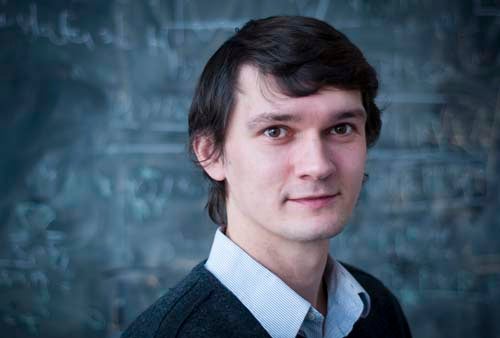
Physics prof awarded prestigious Sloan Research Fellowship
Waterloo physicist who helps us understand the thinnest - yet one of the strongest materials known to man - is honoured

Waterloo physicist who helps us understand the thinnest - yet one of the strongest materials known to man - is honoured
By Katharine Tuerke Faculty of ScienceA Waterloo physicist whose theoretical research has resulted in a better understanding of the thinnest - yet one of the strongest materials known to man - has been awarded a prestigious fellowship from the Alfred P. Sloan Foundation.
Dmitry Abanin is the recipient of a Sloan Research Fellowship – an award given annually to promising scientists, mathematicians and economists from Canada and the United States who are at an early stage in their careers.
 “For a society to really grow, it needs people who are pushing the boundaries of what’s known to make new progress,” said Abanin. “That’s why this kind of fellowship is important – it supports people who are probing the edges of knowledge. It will help me, my group, and our research go farther.”
“For a society to really grow, it needs people who are pushing the boundaries of what’s known to make new progress,” said Abanin. “That’s why this kind of fellowship is important – it supports people who are probing the edges of knowledge. It will help me, my group, and our research go farther.”
Theories enrich understanding of the world
Abanin is a faculty member at the Perimeter Institute. He also holds an adjunct professorship in the Department of Physics and Astronomy at the University of Waterloo and is an Associate Faculty member of Waterloo’s Institute for Quantum Computing.
Abanin has been recognized for his ground-breaking theoretical research in condensed matter physics of unique materials, including graphene. Graphene, a single layer of carbon, is a newer crystalline material that is no thicker than a single atom but stronger than a layer of steel at the same thickness.
Condensed matter physics is the branch of physics that studies systems of very large numbers of particles in a condensed state, like solids or liquids.
Abanin’s work has resulted in a number of significant theories related to graphene. Several of his theoretical predictions have been confirmed experimentally, a remarkable achievement for a physicist so early in his career. Graphene has important applications for medicine, integrated circuits, solar cells and superconductors.
“Many of these ideas will enrich our understanding of the world, and some will really click and lead to something big,” said Abanin.
Worked with Nobel Prize winners
He joined Perimeter in 2013 following postdoctoral research positions at Harvard and Princeton universities. He has worked alongside Andre Geim and Konstantin Novoselov whose ground-breaking research on graphene was awarded the 2010 Nobel Prize in Physics.
Other avenues of Abanin’s research will contribute to a greater understanding of how nature works at the quantum scale, and might also lead to quantum information applications.
For more than a half-century, the prestigious Sloan Research Fellowships have been awarded annually to the rising stars of science in Canada and the United States, helping establish them as the next generation of scientific leaders in areas spanning physics, chemistry, biology, and related disciplines. Recipients receive $50,000 over the next two years to pursue any line of research they choose.

Read more
Graduate students Robie Hennigar and Samuel Jaques recognized for their outstanding academic record and research

Read more
Waterloo Philosophy Professor Heather Douglas has been named a Fellow of the American Association for the Advancement of Science (AAAS)

Read more
One researcher hopes to contribute to the development of better cancer drugs while the other is expanding our understanding of gravity
The University of Waterloo acknowledges that much of our work takes place on the traditional territory of the Neutral, Anishinaabeg, and Haudenosaunee peoples. Our main campus is situated on the Haldimand Tract, the land granted to the Six Nations that includes six miles on each side of the Grand River. Our active work toward reconciliation takes place across our campuses through research, learning, teaching, and community building, and is co-ordinated within the Office of Indigenous Relations.